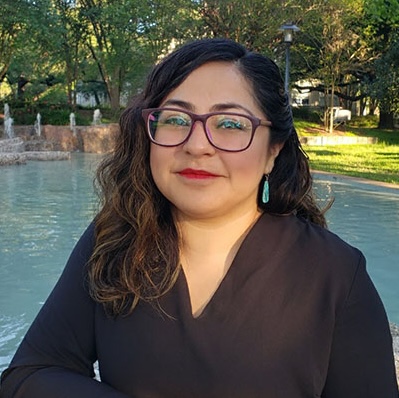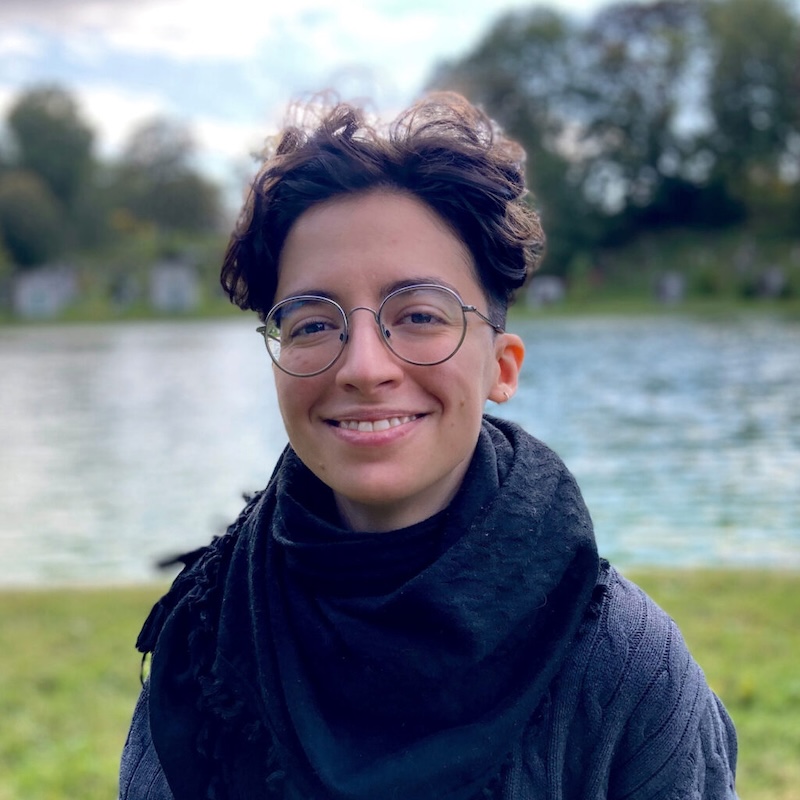Working with Data for Social Change
A One Day Symposium
March 14, 2025
KOBL 140, CU Boulder
In Person & Zoom
Overview
This event brings together local and national scholars who have engaged in digital public humanities projects to advocate for social change and who have worked to strengthen ethical data humanities education in higher education. Together, we will explore how data-driven projects can address contemporary social issues while contributing to the humanities at large as well as how higher education can do more to prepare students for data advocacy work in their local communities and future careers.
Featured Speakers

Sylvia Fernández Quintanilla
United Fronteras, Torn Apart/Separados
Sylvia Fernández Quintanilla (she/her) is Assistant Professor of Public and Digital Humanities in the Interdisciplinary School of Engagement at the University of Texas at San Antonio. Her research and teaching focus on documenting and retelling data narratives of social justice through the lenses of transborder studies, decolonial and postcolonial digital humanities, and feminist practices. She employs interdisciplinary methods to create ethical, responsible and inclusive digital projects that engage with local, transnational, and translingual data from underrepresented communities.
In this presentation, I will explore methodologies for creating datasets on human rights issues, such as gender violence and feminicides, by engaging with transnational and multilingual data from both analog and digital sources. Drawing on frameworks from postcolonial digital humanities (Risam, 2019) and critical data studies, including data feminism (Klein & D'Ignazio, 2020), data terrorism (Luchessi, 2022), counter data (D'Ignazio, 2024), and international data violence (Fernández, 2025), I will discuss a pedagogical approach that enables students to engage with diverse materials—literary texts, archival documents, and oral histories—to develop multilingual datasets and feminist visualizations. Through this approach, students practiced ethical and responsible data production, grounding their work in feminist, intersectional, and humanistic inquiry. I will also share key insights, including the need for cross-disciplinary courses, the global urgency of preserving gender violence data, and the critical role of multilingual digital humanities in fostering inclusive and ethical data practices.

Melanie Walsh
Responsible Data Sets in Context
Melanie Walsh is an Assistant Professor in the Information School and an Adjunct Assistant Professor in the English Department at the University of Washington. She is co-PI of the Responsible Datasets in Context project, a repository of teachable datasets that foregrounds context and humanities perspectives, and that has been funded by the Mozilla Foundation. She is the author of the open-source textbook, Introduction to Cultural Analytics & Python, which introduces the programming language Python to people interested in the humanities and social science.
While understanding the social and historical context of data is one of the most essential skills for responsible technologists, it is one of the most neglected skills in undergraduate computing education. In this presentation, Melanie Walsh will discuss how she and her collaborators have sought to elevate context in data education through the Responsible Dataset in Context project, a data repository funded by a Mozilla Responsible Computing Challenge award. She will specifically discuss one of the datasets featured in the project—a dataset of visits to U.S. National Parks—and narrate how she incorporates this dataset into her introductory programming classes, demonstrating how a dataset’s construction, documentation, limitations, and history can drastically impact interpretations and results.

Melissa Borja
Melissa Borja leads the Virulent Hate Project, which uses news media to track incidents of anti-Asian racism and Asian American anti-racism activism. She is also on the advisory council of the Bridging Divides Initiative, which aims to track and mitigate political violence.
In 2020 and 2021, the Covid-19 pandemic sparked hundreds of attacks against people of Asian descent in the United States and around the world. In response, ethnic studies scholars committed to improving both scholarly and public understanding of this problem developed the Virulent Hate Project, a collaborative interdisciplinary research project that draws on news media to identify incidents of anti-Asian racism and anti-racism activism. This presentation will discuss the goals, methods, and findings of the Virulent Hate Project; the challenges researchers have faced; and how the project has changed over time and adapted to shifting political circumstances and public discourses about racism.

Nasreen Abd Elal
Nasreen Abd Elal is a graphic designer, researcher, and organizer based in New York City. Since 2020, she has worked as an Information Designer at Visualizing Palestine, an organization dedicated to using data and research to visually communicate Palestinian experiences and provoke narrative change.
This presentation will introduce Visualizing Palestine’s approach to data storytelling for Palestine, and will provide an overview of the infographics and interactive projects that VP has produced over the last decade to combat the exclusion of Palestinian perspectives from mainstream political, cultural, and media institutions. We’ll then move to explore VP’s approach to research, brief-writing, visual development, and data storytelling. Participants will learn about VP’s methodology for creating responsive, rigorously-sourced educational resources that can support social justice struggles, using open-source tools and collaborative partnerships with researchers in Palestine and across the world. The presentation will highlight the politics of data within a colonial context, focusing on how VP approaches issues such as fragmented data sources, dehumanizing biases, and producing research in the context of genocide.
Schedule
All times in Mountain Standard Time (MST)
Meet & Greet with Coffee & Pastries
Welcome & Introduction
Advancing Data Humanities Education Through Collaborative Research Grants
- Melanie Walsh: Responsible Data Sets in Context
- David Glimp: Data Science For All
- Cameron Blevins & Nathan Pieplow: Data Advocacy For All
Lunch
Leveraging Data for Social Change
- Melissa Borja: Virulent Hate Project
- Nasreen Abd Elal: Visualizing Palestine
- Laurie Gries: Swastika Counter Project
Break
Educating Students to Work with Data in Ethical and Powerful Ways
- Sylvia Fernández Quintanilla (United Fronteras and Torn Apart/Separados)
- Nickoal Eichmann-Kalwara (CU Boulder)
- Aditya Ranganath (CU Boulder)
- John Tinnell (CU Denver)
Closing
Registration
Please register for the event to receive the Zoom link and additional event details.
Sponsors
Data Advocacy for All – A CU Next Award Grant Project
The WRITE Lab/PWR @ CU Boulder
For more information, contact Laurie Gries (legries@colorado.edu)